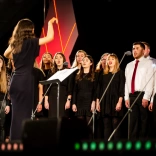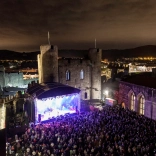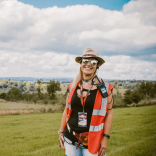I’m by far the youngest chorister. I certainly bring the average age down quite a bit. The oldest is Fred in the baritones. He’s turning 90 next year. You wouldn’t guess from looking at me, but I’ve got the lowest voice in the choir. I’m the bassiest bass they’ve got.
We basses never get to sing the tunes. Sometimes you want to sing all the happy-go-lucky notes in the melodies. But it’s remarkable to be a piece in this massive puzzle. It’s an experience that’s humbling and powerful at the same time. Because you’re all working to produce this sound - this music - for people in the audience to hear. I think that’s a beautiful thing.
I didn’t have much of a formal education until I was about 15. I was born with a type of arthritis in my joints. With winter coming up, I can’t write my name some days. I was never going to get the support I needed in primary education. So what was the point of me being there? My attendance went down to 2.5% one year.
For most of my education I taught myself everything I thought I needed to know. I taught myself how to read. By the time I was 13 I was teaching myself all sorts of random rubbish, like the philosophy of René Descartes. Which actually comes in handy, now that I’m doing my A-levels. At college I’m doing my dissertation on the topic of male voice choirs.
I was about 16 when a teacher suggested that I should look for a male voice choir. Her father and uncle sang in choirs, so she encouraged me to keep up the tradition. I started with my local choir and then I was poached for Pontypridd by our musical director, Merin.
Ryan ThomsonIt’s remarkable to be a piece in this massive puzzle. It’s an experience that’s humbling and powerful at the same time. Because you’re all working to produce this sound - this music - for people in the audience to hear. I think that’s a beautiful thing."
How do the older choristers treat me? Like family. No matter what walk of life you’re from, or however you’ve been brought up, they treat you as one of their own. That’s why I like singing in a choir. Because it’s not just a social thing. It’s more like a second family.
Favourite pieces? I’ve got a soft spot for the Welsh ones. When I started singing in a choir, I didn’t speak a word of Welsh. I didn’t even know the Welsh national anthem. It was quite a challenge to sing in Welsh for the first time, but I really like traditional hymns like Gwahoddiad.
I’ve only been singing in choirs for two-and-a-half years, but it’s given me so many experiences already. We were invited to sing for a Zulu princess in Brecon. She was a lovely lady. She told Fred, the oldest chorister, ‘You are now my Welsh boyfriend.’
With another choir I went to Windsor Castle to sing for the King’s coronation. There were quite a few famous people performing, but the only two I’d heard of were Lionel Richie and Bryn Terfel. I met the Only Boys Aloud choir at Windsor, and now I sing with them, too.
There are still quite a lot of choirs around here, but it’s not the same as when the mines were open and the chapels were thriving. Both have declined, and so the choirs are becoming smaller.
Rather than something that just exists in the past it must exist in the future. I’m not saying that Wales would be lost without male voice choirs, but culturally it would have a terrible impact. You can’t replace this ongoing history.
More:




